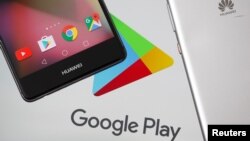The giant U.S. internet search engine Google said Monday it is restricting China's Huawei from access to its Android operating system in compliance with the Trump administration's blacklisting of the world's second biggest smartphone maker as a national security threat.
Google said it is "reviewing the implications" of last week's order requiring export licenses for technology sales to Huawei.
The U.S. and Chinese companies said millions of Huawei phones already in use around the world would continue to have access to such popular Google services as Gmail, YouTube and maps.
But last week's U.S. order would curb the future transfer of hardware, software and services to Huawei, possibly limiting the Chinese company's expansion globally and its efforts to overtake South Korea's Samsung as the world's biggest smart phone manufacturer.
Google services were already banned in China, so analysts say the impact of the curb on technology sales could mostly affect Huawei's international sales, making its phones less attractive to customers if they do not have Google features. Last year, Huawei sold nearly half of its production of 208 million smart phones overseas and the rest in China.
"Huawei will continue to provide security updates and after-sales services to all existing Huawei and Honor smartphone and tablet products, covering those that have been sold and that are still in stock globally," a Huawei spokesman said.
The Chinese firm is at the center of ongoing trade disputes between Washington and Beijing. The U.S. contends that Huawei's technology could be used to spy on Americans, allegations Huawei has repeatedly denied.
China and the U.S. are in the midst of months-long trade talks with the world's two biggest economies engaging in tit-for-tat tariff increases on hundreds of billions of dollars worth of each other's exports.




